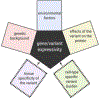Somatic variants in epilepsy - advancing gene discovery and disease mechanisms
- PMID: 32422520
- PMCID: PMC7666655
- DOI: 10.1016/j.gde.2020.04.004
Somatic variants in epilepsy - advancing gene discovery and disease mechanisms
Abstract
In the past ten years, there has been increasing recognition that cells can acquire genetic variants during cortical development that can give rise to brain malformations as well as nonlesional focal epilepsy. These often brain tissue-specific, de novo variants can result in highly variable phenotypes based on the burden of a variant in specific tissues and cells. By discovering these variants, shared pathophysiological mechanisms are being revealed between clinically distinct disorders. Beyond informing disease mechanisms, mosaic variants also offer a powerful research tool to trace cellular lineages, to study the roles of specialized cell types in disease presentation, and to establish the cell-type specific genomic consequences of a variant.
Copyright © 2020 Elsevier Ltd. All rights reserved.
Conflict of interest statement
Competing Interests
The author declares no conflict of interest.
Figures
References
-
- Epi4K Consortium, Epilepsy Phenome/Genome Project: Ultra-rare genetic variation in common epilepsies: a case-control sequencing study. Lancet Neurology 2017, 16:135–143. - PubMed
-
-
EuroEPINOMICS-RES Consortium, Heyne HO, Singh T, Stamberger H, Jamra RA, Caglayan H, Craiu D,Jonghe PD,Guerrini R, Helbig KL, et al.: De novo variants in neurodevelopmental disorders with epilepsy. Nat Genet 2018, 50:1048–1053.
* The Epi25 Collaborative reports the results of the largest exome sequencing study performed to date oncomparing 9,170 individuals with epilepsy, including individuals with developmental and epileptic encephalopathies, genetic generalized epilepsy, and nonacquired focal epilepsy, to ~8,500 controls. In all types of epilepsy there was an enrichment of ultra-rare deleterious variants in genes intolerant to functional variation suggesting that ultra-rare variants contribute to epilepsy risk. This study confirms the findings from an earlier study showing overlapping genetic contributors in both rare and common epilepsies.
-
Publication types
MeSH terms
Substances
Grants and funding
LinkOut - more resources
Full Text Sources
Medical
Molecular Biology Databases
Miscellaneous



